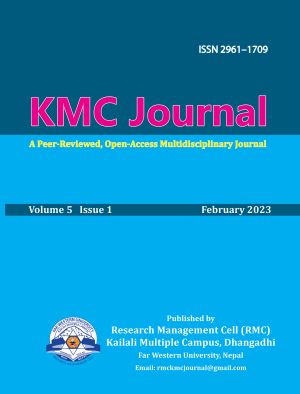Applying Context, Input, Process and Product (CIPP) Model for Course Evaluation
DOI:
https://doi.org/10.3126/kmcj.v5i1.52460Keywords:
Pedagogy, objectives, M.Ed., curriculum, semesterAbstract
The main purpose of this study was to evaluate the course titled ELT Pedagogy and Materials from the M.Ed. III semester programme of education under Tribhuvan University by using context, input, process and product (CIPP) model. The evaluation process had gone through qualitative research method using purposively selected five M.Ed. graduates and a course teacher as research participants for data collection. The data was obtained through semi-structured interview and story of everyday class experience of research participants to have an in-depth understanding of their phenomenon. The result indicated that the course has sufficiently identified the needs of secondary level teachers but there seems a lack of coordination between theory and practice. Both students and teachers agreed that objectives of the course are very realistic. However, micro context could not be covered such as lack of focusing in rural context of English language teaching (ELT) and also teachers could not come out from stereotypical teaching pedagogy, brought a sort of disappointment regarding the course and its outcome. Hence, this study implies the worth of implication of CIPP model for programme evaluation and helps to mitigate its pedagogical challenges for better teaching and learning outcomes.
Downloads
Downloads
Published
How to Cite
Issue
Section
License
Copyright (c) 2023 Rejina K.C., Parmeshor Baral

This work is licensed under a Creative Commons Attribution-NonCommercial 4.0 International License.
This license allows reusers to distribute, remix, adapt, and build upon the material in any medium or format for noncommercial purposes only, and only so long as attribution is given to the creator.




